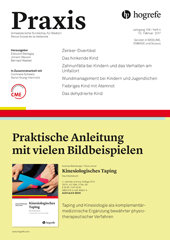Das dehydrierte Kind
Abstract
Zusammenfassung. Die häufigsten Gründe, weshalb ein Kind in der Praxis oder im Spital vorgestellt wird, sind Dehydratation und Trink-/Essensverweigerung aufgrund einer akuten Gastroenteritis (AGE). Die häufigste Ursache einer AGE ist das Rotavirus, gefolgt von Norovirus und seltenen bakteriellen Erkrankungen. Eine Erregerdiagnostik ist dabei nur selten nötig. Der Dehydratationsgrad wird vornehmlich klinisch anhand eines Dehydratations-Scores gestellt. Ziel der Dehydratationstherapie sind die rasche Rehydrierung und Wiederaufnahme von Flüssigkeit und Nahrung durch das Kind. Eine Rehydratationstherapie (RT) sollte wenn immer möglich per os oder per Magensonde stattfinden und nur in schweren Fällen intravenös. Bei einem prolongierten Verlauf sind weitere Abklärungen beim gastroenterologischen Spezialisten empfehlenswert.
Abstract. The most common reason for presenting a child to the paediatrician’s office or children’s hospital is because of dehydration and refusal of fluid- and food ingestion due to acute gastroenteritis. The prevalent cause of AGE is a viral infection with rotavirus, followed by norovirus and rare bacterial infections. The pathogen diagnostics is not necessary in most cases. The degree of dehydration is assessed by a dehydration score. The goal of the dehydration therapy is a quick rehydration, which should be performed whenever possible orally or via nasogastric tube and early refeeding. Intravenous rehydration should only be performed in severe cases of dehydration. In cases of prolonged diarrhea further investigations by a specialist are recommended.
Résumé. La déshydratation et le refus de boire et/ou de s’alimenter en raison d’une gastroentérite est une cause majeure de consultation pédiatrique en cabinet ainsi qu’en milieu hospitalier. La cause principale est le rotavirus, suivi du norovirus et plus rarement d’infections bactériennes. La recherche de l’agent pathogène est rarement nécessaire. Le degré de déshydratation est évalué par un score clinique. Le but de la thérapie est une rapide correction de l’état de déshydratation, et cela de préférence par voie orale ou par tube nasogastrique. Une réhydratation par voie veineuse est réservée pour les cas graves. En cas de diarrhée prolongée des examens complémentaires sont recommandés.
Bibliografie
, .: European Society for Paediatric Gastroenterology, Hepatology, and Nutrition/European Society for Paediatric Infectious Diseases evidence-based guidelines for the management of acute gastroenteritis in children in Europe. J Pediatr Gastroenterol Nutr 2008; 46 (suppl 2): S81-S122.
, .: Evaluation of the quality of guidelines for acute gastroenteritis in children with the AGREE instrument. J Pediatr Gastroenterol Nutr 2011; 52: 183–189.
, .: Surveillance to estimate the burden of rotavirus gastroenteritis in children aged less than 3 years attending day care centers in Paris, France. Hum Vaccin 2010; 6: 399–406.
: Burden of community-acquired and nosocomial rotavirus gastroenteritis in the pediatric population of Western Europe: a colostrum review. BMC Infect Dis 2012; 12: 62.
: Hospitalizations due to rotavirus gastroenteritis in Catalonia, Spain, 2003–2008. BMC Res Notes 2011; 4: 429.
: Hospitalizations for nosocomial rotavirus gastroenteritis in a tertiary pediatric center: a 4-year prospective study. Am J Infect Control 2009; 37: 465–469.
, .: Prolonged episodes of acute diarrhea reduce growth and increase risk of persistent diarrhea in children. Gastroenterology 2010; 139: 1156–1164.
, .: Effects of prolonged breastfeeding and colostrums fatty acids on allergic manifestations and infections in infancy. Clin Exp Allergy 2012; 42: 918–928.
: European Society for Pediatric Gastroenterology, Hepatology, and Nutrition/European Society for Pediatric Infectious Diseases evidence-based guidelines for the management of acute gastroenteritis in children in Europe: update 2014. J Pediatr Gastroenterol Nutr 2014; 59: 132–152.
, .: Etiology of acute gastroenteritis in children requiring hospitalization in The Netherlands. Eur J Clin Microbiol Infect Dis 2012; 31: 405–415.
, .: Prolonged episodes of acute diarrhea reduce growth and increase risk of persistent diarrhea in children. Gastroenterology 2010; 139: 1156–1164.
, .: Age-related susceptibility to infection with diarrheagenic Escherichia coli among infants from Periurban areas in Lima, Peru. Clin Infect Dis 2009; 49: 1694–1702.
, .: Diarrheal illness in a cohort of children 0–2 years of age in rural Bangladesh: I. Incidence and risk factors. Acta Paediatr 2006; 95:430–437.
: Burden of acute, persistent and chronic diarrhea, Thailand, 2010. J Med Assoc Thai 2012; 95 (suppl 7): S97-S107
: Risk factors for extended duration of acute diarrhea in young children. PLoS One 2012; 7: e36436.
: Präklinische Flüssigkeitstherapie im Kindesalter. Pädiatrie up2date 2013; 08 (01): 67–84.
: New real-time PCR detects prolonged norovirus excretion in highly immunosuppressed patients and children. J Clin Microbiol 2009; 47: 2855–2862.
: Norovirus gastroenteritis in immunocompromised patients. N Engl J Med 2012; 367: 2126–2132.
: Development of a clinical dehydration scale for use in children between 1 and 36 months of age. J Pediatr 2004; 145: 201-207.
: Rotavirus in finnish children: Use of numerical scores for clinical severity of diarrheal episodes. Scand J Infect Dis 1990; 22: 259-267.
, .: An international consensus report on a new algorithm for the management of infant diarrhea. Acta Paediatrica 2016; 105: 284–289.
, .: Prospective assessment of practice pattern variations in the treatment of pediatric gastroenteritis. Pediatrics 2011; 127: e287–295.
: Treatment of acute gastroenteritis in children: an overview of systematic reviews of interventions commonly used in developed countries. Evid Based Child Health 2013; 8: 1123–1137.
The FDA Safety Information and Adverse Event Reporting Program: Zofran (ondansetron) : Drug Safety Communication – Risk of Abnormal Heart Rhythms Posted 09/15/2011; 2011. http://www.fda.gov/Safety/MedWatch/SafetyInformation/SafetyAlertsforHumanMedicalProducts/ucm272041.htm. Letzter Zugriff: 23.1.2017., .: Racecadotril for childhood gastroenteritis: an individual patient data meta-analysis. Dig Liver Dis 2011; 43: 707–713.
, .: Oral diosmectite reduces stool output and diarrhea duration in children with acute watery diarrhea. Clin Gastroenterol Hepatol 2009; 7: 456–462.
: Characteristics of non-typhi Salmonella gastroenteritis associated with bacteremia in infants and young children. Infection 2012; 40: 285–289.
: Antibiotic therapy for Shigella dysentery. Cochrane Database Syst Rev 2010; 8: CD006784.
: Early versus delayed refeeding for children with acute diarrhoea. Cochrane Database Syst Rev 2011; 7: CD007296.



